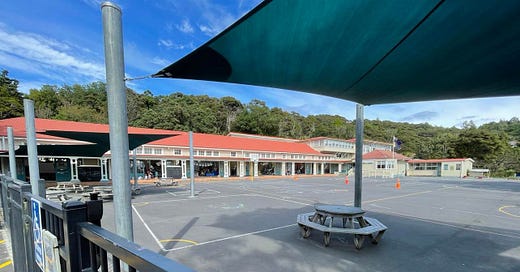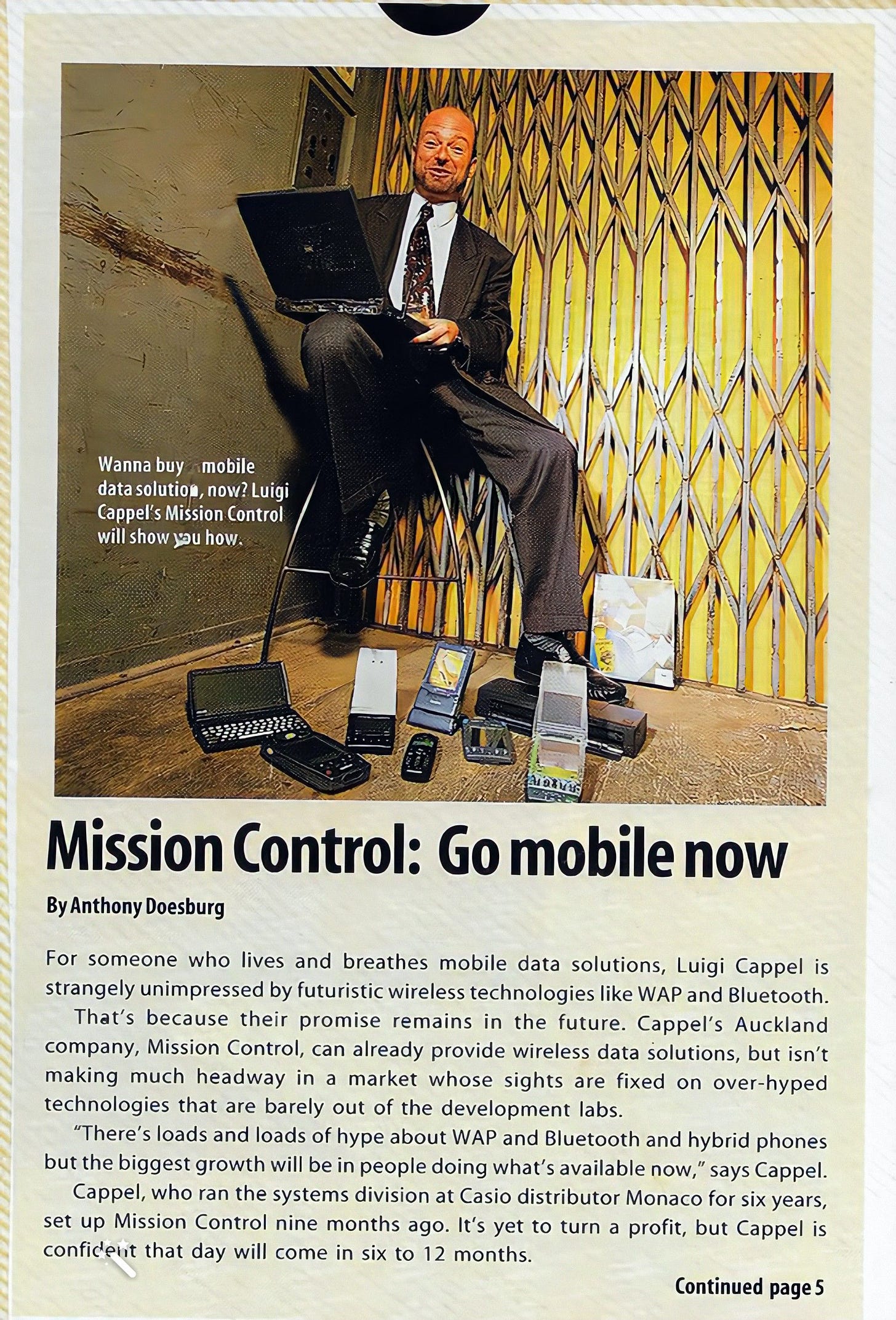A Blueprint for Survival
It's time to stop, Hey, what's that sound, everybody look what's going down
When I was in Standard Three, I guess you would call that Year Five in today’s parlance, although it was Year Four for me because I skipped a year. More on that another day. More on Standard Three another time too, because that was an interesting year for me.
I went to school at Titirangi Primary, which was an awesome school. We had great teachers and I had lots of friends. They knew me as Gino. My parents had originally wanted to give me that name, but there was a law in Holland that you can only give people a name that already exists in the country. There were no Ginos at the time. It was a diminutive of Luigino, so they named me Luigi, but called me Gino. Most people, including myself at the time, thought Gino was my name.
My teacher that year was a great guy called Jack Friel. In that year, he printed off a paper called A Blueprint For Survival on the Gestetner.
If you went to school in the 60s you will remember this predecessor to the Xerox copier. Ours used purple ink, which was diluted with methylated spirits. If you are from that time, you will remember the smell. They would make up a stencil, spin the handle and your document would be reproduced on paper in purple type. I came across one of these machines in a second-hand store in Northland a few years ago. I was tempted to buy it, just for the sake of nostalgia, but I resisted the temptation.
So this document, which I haven’t scanned for some reason, but still have locked up in a plastic storage box, was about predictions for the future, based on the next era being the Age of Communication. Between computers and new forms of telecommunication technology, we were going to be rocketed up to the pinnacle of the hierarchy of needs pyramid, self-actualization. Robots were going to do all the work for us and our biggest problem was going to be what to do with our spare time.
I was fascinated by this and was already a fan of SciFi, reading authors like Philip K Dick, Robert Heinlein, and of course the classics like HG Wells. These concepts were imprinted in my mind, so looking back, it’s no surprise that I spent much of my career in telecommunications, becoming a futurist and mobile computing evangelist.
I spent much of my time teaching people how to work smarter rather than harder as technology-enabled functionality like sending emails and photos from a smartphone. I owned a training school called the New Zealand Smartphone and PDA Academy. I often contracted to Telecom and Vodafone to train corporate managers on how to maximise the use of mobile technology, which would of course increase their mobile data revenues.
Sadly I was a bit ambitious and things took longer than I had hoped for, but they came. Yet today, we can see where things are going and we still want more power, faster data speeds, and clever AIs.
Anyway, what motivated this post, was a video given to me by Arron Judson of Ericsson, who was a coconspirator and sponsor, in establishing the NZ Wireless Forum. I still have the VHS video and it inspired me.
This video, demonstrating the leadership of Ericsson in developing new telecommunications solutions, including mobile phones, telephone exchanges, and even banking communications systems, envisioned life in 2007 with a video created and shared with me in 2000.
The Buffalo Springfield soundtrack from their awesome song For What It’s Worth, is very fitting, even though it is actually a war protest song, it is still so current, both as a war protest and as a soundtrack to our lives which remains relevant.
There’s something happening here What it is aint exactly clear
So after that lengthy preamble, I was going to convert and upload a digital copy of the inspiring video from Ericsson onto YouTube so I could share it with you, but I found someone else had already done that. So thanks to them, it’s saved me a bit of time.
I think you will enjoy watching this video of what Ericsson thought they could achieve in 8 years, and compare it to what we take for granted today. I often talk about the loneliness of the long-distance futurist. Many times I have tried to introduce things around 10 years before it was possible. It has been frustrating, but then I think that without evangelists like me and my many like-minded friends and associates, pushing the boundaries of technology, thinking, and business practice, it would take a lot longer. It takes a lot of courage to be at the bleeding edge of technology, where the majority of people go broke or have to go and find real J.O.B.s because either the technology or the mindset isn’t there yet.
As a footnote, sometimes great change comes as a consequence of a wild card. In current times, that has come in the form of the COVID19 Pandemic.
I spent years, right back to the Mission Control And Wireless Forum days and more recently when I worked for the NZ Automobile Association subsidiary GeoSmart and at NZTA, advocating for telecommuting.
I postulated that instead of focusing on big-budget transport initiatives like Auckland’s CRL, which is going to exceed 4.5 Billion dollars for an underground rail link that only travels 3.4 km, we should investigate whether there actually is a justification, or more importantly a desire by people to work in a CBD at all.
As the video discusses, the whole concept of having most of a company’s staff in an office harkens back to the days when we were tethered to telecommunications and computer cables. We couldn’t leave our desks because either the technology would not allow it, or our senior management thought that a distributed workforce would result in reduced productivity. Often it was a lack of trust. I always used to think these people were judging us based on what they would have done at that stage of our career.
It feels to me as though many of the big projects were about people leaving a legacy, rather than asking the right questions. They will be very proud when the CRL opens, but what if patronage of a service that can transport 54,000 people an hour is only used by 200 people an hour, except when there is an international sporting match or concert? Any researcher will tell you that you can skew any survey by the way you word your question.
So here we are, still trying to push people into CBDs despite overwhelming evidence that productivity increases and costs reduce when people work (at least most of the time) from home, or wherever they want to work from.
Giant corporates like Microsoft and Zoom, facilitators like Mobile Mentor, and new telecommunications technologies such as Fibre and 5G, have made it possible for people to work almost anywhere. Many companies have developed distributed workforces to huge success, being able to scale rapidly, in some cases without even having an HQ. Towns and states around the world are promoting themselves, together with housing developers, to workers, offering them a lifestyle, together with robust telecommunications networks.
Whilst some people cling on to the need for a CBD, with its traffic congestion, and pollution, which ensures that people arrive at an office stressed out before they even start their day, those who have tasted freedom, and a work/life balance that allows them extra time with their families, or engaging in other pursuits, overwhelmingly don’t want to go back. You can do a lot with an extra 2 hours a day recovered from not having to commute in your own time.
I have this thing about research and questions. Instead of asking things like:
Would you rather drive to work or relax using public transport?
How many hours a week do you feel is reasonable to have to spend commuting?
What can we do to make the CBD more attractive to live and work in?
Why not ask questions like:
Where would you like to live?
Where would you like to work?
It feels like we are still asking questions that harken back to decisions made more than 20 years ago. It feels like our 10-year plans should be totally revisited since we have proven with COVID lockdowns that not only do we not need a CBD, most people don’t want to go there for work or even leisure.
How about you? Do you still commute to work? Do you need to work in the city center? Has COVID changed your point of view?
It’s time we stopped Hey, what's that sound Everybody look what's going down






